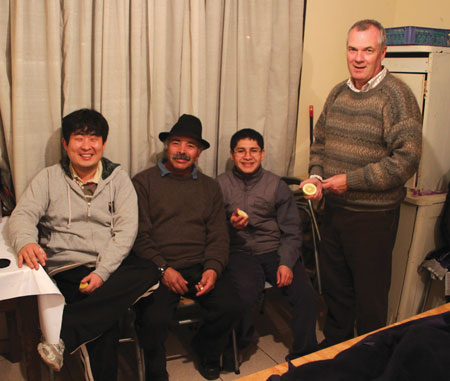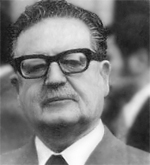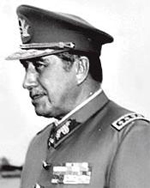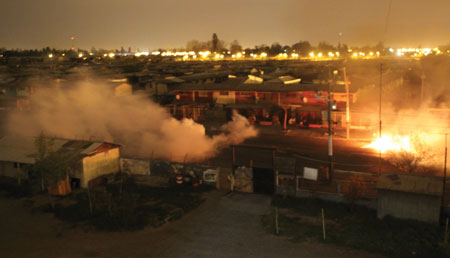Night at the Riots
By Fr John Boles
Fr John Boles is from England and is currently Rector of Student Formation and Parish Priest of Santo Tomás Parish in Santiago, Chile. He belongs to the Columban Region of Peru.Fr Chris Saenz describes in this issue the 2011 riot in La Pintana. Here Fr Boles describes last year’s.
Ever think you might get tear-gassed? Here are a few survival tips: Have a wet handkerchief or surgical mask handy, to cover your nose and mouth; smear a little toothpaste under your eyes - it helps; don’t rub your eyes after being gassed, it’s better to let them stream; once you’ve reached safety, suck a lemon. Its recuperative qualities are remarkable.

Fr John Boles with members of the "Parish Defence Force".
I never imagined that overseas mission might involve getting caught up in riots, but that was before I took up an appointment in a parish on the outskirts of Santiago, the capital of Chile. Santo Tomás parish is located in an area called La Pintana, and La Pintana has ‘history’.
In many ways, Chile is a vibrant, modern nation, probably the wealthiest and best-ordered in South America. It displays moments of great national solidarity - we witnessed the rescue of 33 miners from the now world-famous San José Mine in October 2010.
 President Salvador Allende |
 General Augusto Pinochet |
Nevertheless, beneath the veneer of unity lie certain tensions, many of which stem from the military coup of 11 September 1973 when General Augusto Pinochet overthrew the parliamentary democracy headed by left-wing President Salvador Allende.
Nowadays, most of the world remembers 11 September – ‘9/11’ - as the date of the terrorist attacks on the Twin Towers in New York City. In Chile, however, it is still known as ‘The Day of the Coup’.
Since then, Chilean society has been divided between those who sympathized with Pinochet and those who opposed him. Even though democracy was restored in 1991, the anniversary of the coup is still marked by protests against the security forces. My area of La Pintana, a working-class stronghold, was a hotbed of resistance to military rule, and disturbances occur here every 11 September.
Our problem is that they tend to happen right in front of our parish centre and, at times, spill over into it!

Columban priest John Boles defends his church during September disturbances in Chile.
Hence, each 11 September the priest and parish council get kitted out and prepare to defend our church property. Opposite the entrance to the church lies a supermarket, often the target of looters. (Most of today’s protesters are youngsters who weren’t even born at the time of the coup. Many probably couldn’t even tell you what it was all about. They use the unrest as an excuse for vandalism and robbery).
The supermarket is always guarded by armed police, hunkered down behind concrete barricades. The rioters gather at nightfall, on the sports ground on the other side of the church. And so the action begins.
César, a parish stalwart, is a veteran of the event, with many years of guard duty on this night behind him. ‘It’s the same every year, just like a ritual’, he assured me . . . Apparently, the confrontation follows a well-established pattern. We have a grandstand view of proceedings standing on the roof of the parish hall, and sure enough, things began to work out just as César had predicted.
First, the electricity transformers were sabotaged, plunging the area into darkness. Next, roads were sealed off by erecting barriers of wood and tires, which were then set alight. Finally, the insurgents moved towards the fortified supermarket, throwing stones and bottles.
The police replied with tear gas shells. The rioters withdrew behind their lines - and both sides took a rest, before the whole process began again. And so it would continue, until late into the night.
The danger for us lies in the fact that, sometimes, the repulsed would-be looters have turned on the parish centre instead, venting their frustration on our property or looking to the church for easy pickings.
Once, they ransacked the parish office. Two years ago, they burnt down a wooden outbuilding. So, whenever they got too close for comfort, we don our masks and wet handkerchiefs and make a show of force around the perimeter of the parish centre. We take it in turns to dash for cover in a meeting-room, where we rest our eyes and suck our lemons before sallying forth once more.
Last year we got off lightly. The damage was limited to a few smashed windows and a badly scratched font-door. Maybe the general sense of national unity brought on by the February 2010 earthquake, and the plight of the trapped miners in the north of the country (not to be rescued for another month), had a moderating effect on the combatants. Or the wounds of a conflict going back decades are, with God’s help, finally healing.
In that case, maybe César won’t have to ‘man the barricades’ to defend his church for many more Septembers. Instead, he’ll be able to rest easy . . . and his parish priest as well.
You may email Father John at jboles53@hotmail.com
